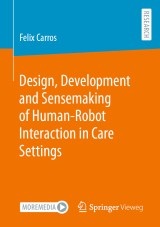Details
Design, Development and Sensemaking of Human-Robot Interaction in Care Settings
|
CHF 118.00 |
|
| Verlag: | Springer Vieweg |
| Format: | |
| Veröffentl.: | 12.09.2024 |
| ISBN/EAN: | 9783658452339 |
| Sprache: | englisch |
| Anzahl Seiten: | 209 |
Dieses eBook enthält ein Wasserzeichen.
Beschreibungen
<p>Social robots have significantly advanced in capabilities and availability, gradually becoming part of everyday life. Their new interactive features are relevant to the struggling care sector. As Western societies age, the demand for care services rises, yet the workforce does not grow at the same rate. This book explores the potential of social robots to support the workforce and enhance the well-being of residents in care homes.<br>
Using a socio-informatics approach, this research investigates how residents and caregivers interact with social robots, examines and facilitates their appropriation, and provides insights into the development of the robots' software and hardware. The research and development were carried out collaboratively in care homes with the people who work and live there.<br>
The findings indicate that social robots can be beneficial in care homes. They broaden the options for social care workers and, when integrated into daily routines, can provide brief respite periods. Additionally, they positively impact residents by engaging them in cognitive and physical activities. However, the robots can only assist, and not replace, care workers.</p>
Using a socio-informatics approach, this research investigates how residents and caregivers interact with social robots, examines and facilitates their appropriation, and provides insights into the development of the robots' software and hardware. The research and development were carried out collaboratively in care homes with the people who work and live there.<br>
The findings indicate that social robots can be beneficial in care homes. They broaden the options for social care workers and, when integrated into daily routines, can provide brief respite periods. Additionally, they positively impact residents by engaging them in cognitive and physical activities. However, the robots can only assist, and not replace, care workers.</p>
<p>About the author <br>
Felix Carros is dedicated to researching human-robot interaction using socio-informatic methods, with a particular focus on the use of robotic systems in care under real-world conditions. His research activities are based at the Chair of Information Systems and New Media of Prof Dr Volker Wulf at the University of Siegen.</p>
Felix Carros is dedicated to researching human-robot interaction using socio-informatic methods, with a particular focus on the use of robotic systems in care under real-world conditions. His research activities are based at the Chair of Information Systems and New Media of Prof Dr Volker Wulf at the University of Siegen.</p>
<p>Social robots have significantly advanced in capabilities and availability, gradually becoming part of everyday life. Their new interactive features are relevant to the struggling care sector. As Western societies age, the demand for care services rises, yet the workforce does not grow at the same rate. This book explores the potential of social robots to support the workforce and enhance the well-being of residents in care homes.<br>
Using a socio-informatics approach, this research investigates how residents and caregivers interact with social robots, examines and facilitates their appropriation, and provides insights into the development of the robots' software and hardware. The research and development were carried out collaboratively in care homes with the people who work and live there.<br>
The findings indicate that social robots can be beneficial in care homes. They broaden the options for social care workers and, when integrated into daily routines, can provide brief respite periods. Additionally, they positively impact residents by engaging them in cognitive and physical activities. However, the robots can only assist, and not replace, care workers.</p>
<p> </p>
<p>About the author <br>
Felix Carros is dedicated to researching human-robot interaction using socio-informatic methods, with a particular focus on the use of robotic systems in care under real-world conditions. His research activities are based at the Chair of Information Systems and New Media of Prof Dr Volker Wulf at the University of Siegen.</p>
Using a socio-informatics approach, this research investigates how residents and caregivers interact with social robots, examines and facilitates their appropriation, and provides insights into the development of the robots' software and hardware. The research and development were carried out collaboratively in care homes with the people who work and live there.<br>
The findings indicate that social robots can be beneficial in care homes. They broaden the options for social care workers and, when integrated into daily routines, can provide brief respite periods. Additionally, they positively impact residents by engaging them in cognitive and physical activities. However, the robots can only assist, and not replace, care workers.</p>
<p> </p>
<p>About the author <br>
Felix Carros is dedicated to researching human-robot interaction using socio-informatic methods, with a particular focus on the use of robotic systems in care under real-world conditions. His research activities are based at the Chair of Information Systems and New Media of Prof Dr Volker Wulf at the University of Siegen.</p>
Diese Produkte könnten Sie auch interessieren:

Mit ChatGPT zum Erfolg: 50 Prompts für maximale Gewinne - Schritt-für-Schritt Businessplan & Einkommensstrategien.

von: Hellene von Waldgraben

CHF 13.00

Blockchain and Digital Assets - The new era of intellectual property for Culture

von: Digital World

CHF 16.00















